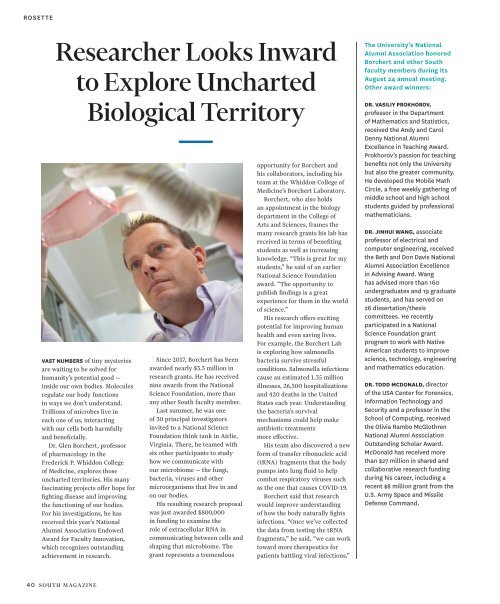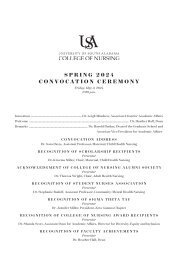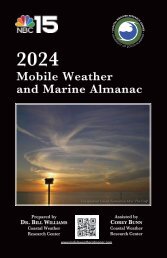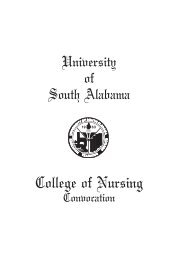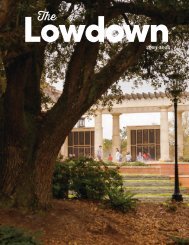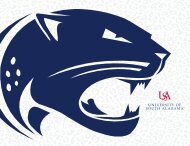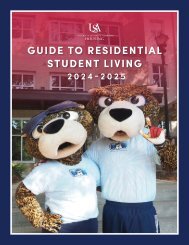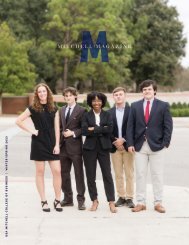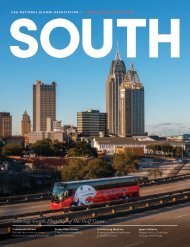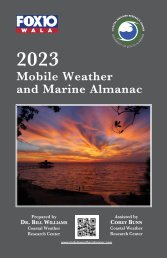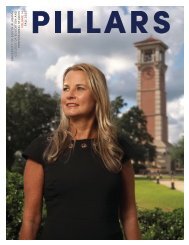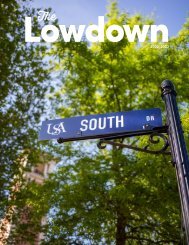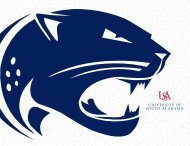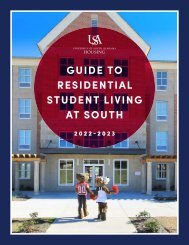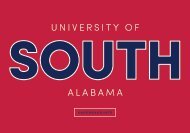South Magazine Fall 2023
You also want an ePaper? Increase the reach of your titles
YUMPU automatically turns print PDFs into web optimized ePapers that Google loves.
ROSETTE<br />
Researcher Looks Inward<br />
to Explore Uncharted<br />
Biological Territory<br />
VAST NUMBERS of tiny mysteries<br />
are waiting to be solved for<br />
humanity’s potential good —<br />
inside our own bodies. Molecules<br />
regulate our body functions<br />
in ways we don’t understand.<br />
Trillions of microbes live in<br />
each one of us, interacting<br />
with our cells both harmfully<br />
and beneficially.<br />
Dr. Glen Borchert, professor<br />
of pharmacology in the<br />
Frederick P. Whiddon College<br />
of Medicine, explores those<br />
uncharted territories. His many<br />
fascinating projects offer hope for<br />
fighting disease and improving<br />
the functioning of our bodies.<br />
For his investigations, he has<br />
received this year’s National<br />
Alumni Association Endowed<br />
Award for Faculty Innovation,<br />
which recognizes outstanding<br />
achievement in research.<br />
Since 2017, Borchert has been<br />
awarded nearly $3.3 million in<br />
research grants. He has received<br />
nine awards from the National<br />
Science Foundation, more than<br />
any other <strong>South</strong> faculty member.<br />
Last summer, he was one<br />
of 30 principal investigators<br />
invited to a National Science<br />
Foundation think tank in Airlie,<br />
Virginia. There, he teamed with<br />
six other participants to study<br />
how we communicate with<br />
our microbiome — the fungi,<br />
bacteria, viruses and other<br />
microorganisms that live in and<br />
on our bodies.<br />
His resulting research proposal<br />
was just awarded $800,000<br />
in funding to examine the<br />
role of extracellular RNA in<br />
communicating between cells and<br />
shaping that microbiome. The<br />
grant represents a tremendous<br />
opportunity for Borchert and<br />
his collaborators, including his<br />
team at the Whiddon College of<br />
Medicine’s Borchert Laboratory.<br />
Borchert, who also holds<br />
an appointment in the biology<br />
department in the College of<br />
Arts and Sciences, frames the<br />
many research grants his lab has<br />
received in terms of benefiting<br />
students as well as increasing<br />
knowledge. “This is great for my<br />
students,” he said of an earlier<br />
National Science Foundation<br />
award. “The opportunity to<br />
publish findings is a great<br />
experience for them in the world<br />
of science.”<br />
His research offers exciting<br />
potential for improving human<br />
health and even saving lives.<br />
For example, the Borchert Lab<br />
is exploring how salmonella<br />
bacteria survive stressful<br />
conditions. Salmonella infections<br />
cause an estimated 1.35 million<br />
illnesses, 26,500 hospitalizations<br />
and 420 deaths in the United<br />
States each year. Understanding<br />
the bacteria’s survival<br />
mechanisms could help make<br />
antibiotic treatments<br />
more effective.<br />
His team also discovered a new<br />
form of transfer ribonucleic acid<br />
(tRNA) fragments that the body<br />
pumps into lung fluid to help<br />
combat respiratory viruses such<br />
as the one that causes COVID-19.<br />
Borchert said that research<br />
would improve understanding<br />
of how the body naturally fights<br />
infections. “Once we’ve collected<br />
the data from testing the tRNA<br />
fragments,” he said, “we can work<br />
toward more therapeutics for<br />
patients battling viral infections.”<br />
The University’s National<br />
Alumni Association honored<br />
Borchert and other <strong>South</strong><br />
faculty members during its<br />
August 24 annual meeting.<br />
Other award winners:<br />
DR. VASILIY PROKHOROV,<br />
professor in the Department<br />
of Mathematics and Statistics,<br />
received the Andy and Carol<br />
Denny National Alumni<br />
Excellence in Teaching Award.<br />
Prokhorov’s passion for teaching<br />
benefits not only the University<br />
but also the greater community.<br />
He developed the Mobile Math<br />
Circle, a free weekly gathering of<br />
middle school and high school<br />
students guided by professional<br />
mathematicians.<br />
DR. JINHUI WANG, associate<br />
professor of electrical and<br />
computer engineering, received<br />
the Beth and Don Davis National<br />
Alumni Association Excellence<br />
in Advising Award. Wang<br />
has advised more than 160<br />
undergraduates and 19 graduate<br />
students, and has served on<br />
26 dissertation/thesis<br />
committees. He recently<br />
participated in a National<br />
Science Foundation grant<br />
program to work with Native<br />
American students to improve<br />
science, technology, engineering<br />
and mathematics education.<br />
DR. TODD MCDONALD, director<br />
of the USA Center for Forensics,<br />
Information Technology and<br />
Security and a professor in the<br />
School of Computing, received<br />
the Olivia Rambo McGlothren<br />
National Alumni Association<br />
Outstanding Scholar Award.<br />
McDonald has received more<br />
than $27 million in shared and<br />
collaborative research funding<br />
during his career, including a<br />
recent $8 million grant from the<br />
U.S. Army Space and Missile<br />
Defense Command.<br />
40 SOUTH MAGAZINE


